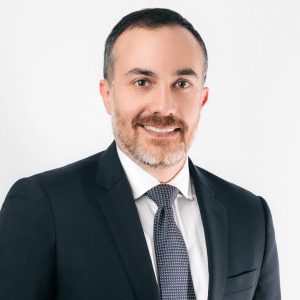Legal Consultant Limelight: Patrick Dempsey
By Alison Preece | October 26, 2020 | Legal Consultant Limelights, Litigation Funders

Patrick Dempsey is the Chief Investment Officer for Therium’s U.S. operations, heading up the investment team based in New York. Therium is a top-rated, global third-party litigation funder with over $1B under management.
A litigator by background, Dempsey was drawn to the world of litigation finance because he saw the revolutionary potential for the market. A member of the 2020 Lawdragon 100 Global Leaders in Legal Finance, Dempsey joined Therium in 2016.
Lawdragon: Where does Therium focus, both geographically and in terms of practice areas?
Patrick Dempsey: Therium has a broad mandate and can fund disputes in most jurisdictions of the world. At its core, we focus on commercial disputes. Beyond general commercial claims, we also fund banking and financial markets cases; securities and shareholder disputes; international commercial arbitration; investment treaty arbitration; antitrust; IP disputes, including patent and trade secret litigation; insolvency; insurance disputes; tax litigation; fraud litigation; shipping/trade disputes; and the enforcement of judgments and awards.
LD: Litigation funding has seen rapid growth in recent years, but it was met with some skepticism early on from certain people. How did you first decide to join the field?
PD: I’ve always struggled with the efficiency of the “billable hour model” at most law firms and saw funding as a catalyst to change the way the legal market works – or, if not, to at least arbitrage the disconnect between clients looking for results-based engagements and firms structured around the billable hour. When the Therium opportunity presented itself, I jumped at it. Plus, it was a chance to reunite with my former colleague and friend, Therium’s U.S. CEO Eric Blinderman, to launch Therium’s footprint in the U.S.
LD: Your firm has emerged as a market leader in the litigation funding space. From your vantage point, what sort of trends are you seeing in the industry at the moment?
PD: Traditionally, the recipients of our funding are usually smaller companies that have found themselves wronged in some way by a much larger company and do not have the ability or resources to bring the claim forward – perhaps because they have been crippled financially, forced into dire straits, or have had necessary payments withheld. Our funding levels that playing field for these claim holders against better-resourced adversaries. Increasingly, though, the companies that are coming to us have the balance sheet to fund the dispute but are instead looking to free up cash to be used for core aspects of their businesses, separate and apart from the litigation or arbitration. The law firms we work with range from small litigation boutiques who are very comfortable taking risk but need more regular cash flow all the way to big international law firms that are not set up to take risk and are looking simply to be paid by the billable hour.
The coronavirus pandemic has also kept us busier than we were before the pandemic. The types of cases haven’t really changed all that much, although we have seen an uptick in insolvency, insurance, and intellectual property claims. What has changed are the number of firms and parties that are inquiring about funding – more and more companies are faced with uncertain balance sheets and revenues and are increasingly turning to us to help them unlock the value of their litigation assets or otherwise preserve cash on hand. And we are seeing more opportunities with firms that are traditionally focused on defense-side work that are exploring ways to develop their plaintiff-side practices as a way to generate more revenue.
LD: You began your career as a lawyer, correct?
PD: Yes, before joining Therium, I was a litigator in the New York office of Hogan Lovells, where my practice focused largely on consumer finance, lender liability, and other complex financial services litigation in state and federal trial and appellate courts. I started my legal career with Proskauer, where I concentrated on trademark/false advertising matters, international arbitration, sports litigation, and complex commercial disputes. At both firms, I regularly took cases through to trial or arbitral hearings. I have extensive experience in contract disputes, business torts, trademark and patent disputes, trade secret theft, and regulatory investigations in a broad range of industries as diverse as financial services, hedge funds and private equity, consumer products, food and beverage, sports and entertainment, real estate, biotechnology, health care, insurance, telecommunications, and technology. All of this experience is very helpful to my current position.
LD: What advice would you give potential clients in terms of how to most productively work with a litigation funding firm such as yours?
PD: When we are looking at investments, we typically focus on five core areas: First is the likelihood of success on the merits – are the claim holders going to win? Next, the quantum of damages – how much will they win? Third is collection risk – can the other party pay the judgment or award? Fourth is the timeframe of the investment – how long will it take from initial investment to recovery? And finally, the judgment and calibre of the lawyers handling the case. The best advice I can give is to be honest about your claim – cases are rarely the “best case I’ve ever seen” and are going to have drawbacks or unhelpful facts. Don’t hide those when presenting the claim but rather deal with them upfront so that we don’t uncover them later during our diligence.
LD: What do you do for fun when you’re not working?
PD: Most of my time outside of the office is spent with my wife and three kids in Brooklyn, New York. I'm also a big sports fan, particularly American football and basketball and, increasingly, motorsports. When my kids let me, I'm also an avid consumer and armchair critic of high- and low-brow television.

